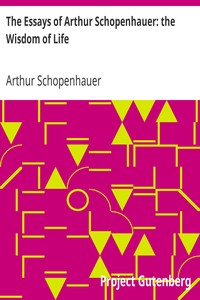The Essays of Arthur Schopenhauer: the Wisdom of Life by Arthur Schopenhauer
"The Essays of Arthur Schopenhauer: the Wisdom of Life" by Arthur Schopenhauer is a philosophical collection written in the early 19th century. The work examines the essence of happiness and how individuals can cultivate a fulfilling life by understanding three primary aspects: personality, property, and social position. Schopenhauer’s approach emphasizes the internal reflections of a person's character over the material or societal accolades they might attain. At the start of the book,
Schopenhauer introduces the concept of "Eudaemonology," which serves as the study of happiness and the means to achieve a pleasurable existence. He outlines his fundamental argument that a person's happiness is primarily governed by what they are internally—referring to their character, health, and intellect—rather than external factors such as wealth or reputation. In this opening section, he critiques the tendency of individuals to rely on societal judgment and external validation for their happiness, emphasizing that true contentment comes from a sound and well-developed inner life. (This is an automatically generated summary.)
Read now or download (free!)
| Choose how to read this book | Url | Size | ||||
|---|---|---|---|---|---|---|
| Read online (web) | https://sendtokindle.compellingsciencefiction.com/ebooks/10741.html.images | 268 kB | ||||
| EPUB3 (E-readers incl. Send-to-Kindle) | https://sendtokindle.compellingsciencefiction.com/ebooks/10741.epub3.images | 184 kB |
Send
to kindle email: |
|||
| EPUB (older E-readers) | https://sendtokindle.compellingsciencefiction.com/ebooks/10741.epub.images | 188 kB | ||||
| EPUB (no images, older E-readers) | https://sendtokindle.compellingsciencefiction.com/ebooks/10741.epub.noimages | 168 kB | ||||
| Kindle | https://sendtokindle.compellingsciencefiction.com/ebooks/10741.kf8.images | 412 kB | ||||
| older Kindles | https://sendtokindle.compellingsciencefiction.com/ebooks/10741.kindle.images | 393 kB | ||||
| Plain Text UTF-8 | https://sendtokindle.compellingsciencefiction.com/ebooks/10741.txt.utf-8 | 234 kB | ||||
| Download HTML (zip) | https://www.gutenberg.org/cache/epub/10741/pg10741-h.zip | 181 kB | ||||
| There may be more files related to this item. | ||||||
Similar Books
About this eBook
| Author | Schopenhauer, Arthur, 1788-1860 |
|---|---|
| Translator | Saunders, T. Bailey (Thomas Bailey), 1860-1928 |
| Title | The Essays of Arthur Schopenhauer: the Wisdom of Life |
| Note | Reading ease score: 54.4 (10th to 12th grade). Somewhat difficult to read. |
| Credits |
Etext produced by Juliet Sutherland, Josephine Paolucci and the Online
Distributed Proofreading Team. HTML file produced by David Widger |
| Language | English |
| LoC Class | B: Philosophy, Psychology, Religion |
| Subject | Conduct of life |
| Subject | Maxims |
| Category | Text |
| EBook-No. | 10741 |
| Release Date | Jan 1, 2004 |
| Most Recently Updated | Dec 20, 2020 |
| Copyright Status | Public domain in the USA. |
| Downloads | 2354 downloads in the last 30 days. |
| Project Gutenberg eBooks are always free! | |

